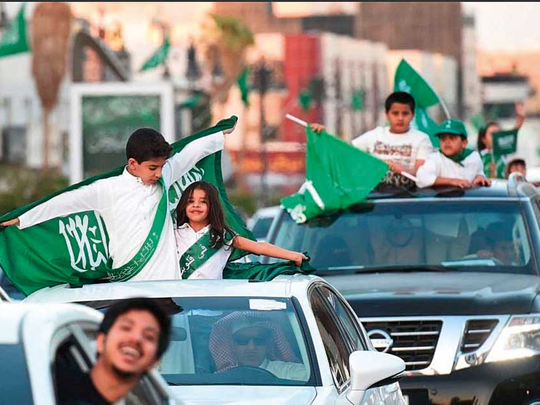
Jeddah: Patriotic fervour reverberated across Saudi Arabia on Friday, ahead of its 87th National Day (September 23).
Huge posters of King Salman and Crown Prince Mohammad Bin Salman were seen hanging on iconic buildings; the national flag waves from people’s homes and cars; the façade of the malls are lit green; and schools, super-markets, shops and streets are decorated with banners of mini national flags, and green and white balloons and streamers.
Young boys can be seen sporting green and white tees and caps, and girls aesthetic scarves and abayas.
Traditional music and songs blaring from cars pumps one with energy and swell with pride for being a proud citi-zen or a resident of the kingdom. Celebrations and festivities take place all around the country.
“I’m grateful for the scholarships that King Abdullah offered to Saudis. In 2010, I was one of the students who was honoured and selected to pursue my master’s degree abroad (USA) in my chosen field,” Abrar Abdul Lateef, a young entrepreneur, told Gulf News adding that she was proud to live in a safe, stable country that provides great healthcare and education to its citizens.
“I’m proud of the 2030 vision that shows our government has a plan and a vision for the future of the country,” Abdul Aziz Sulaiman, a Saudi national training to be a pilot, said.
Saudi Arabia Vision 2030 outlined by Crown Prince Mohammad Bin Salman aims to increase employment and diversify revenue sources as low oil prices have hit the finances of the world’s top exporter.
Some of the planned changes, like increasing the number of women in the overall workforce to 28 per cent from 23 per cent and quadrupling their presence in senior civil service roles to 5 per cent, would transform a society where employment has traditionally been the preserve of men
He also said he was happy that authorities were taking good care of soldiers’ families fighting in Yemen.
Hashim Alawi, who is in his third year of medical school, said: “I’m proud that the government is taking steps to create more employment opportunities for Saudi men and women.”
On her part, Amal Azhar, a Sri Lankan national, said she felt that Saudi Arabia was a safe place to raise her children.
“Here, they are sheltered from corruption because the lifestyle limits teenagers’ exposure to things like alcohol, drugs and mixed company.”
-Sadiya is a freelance journalist based in Jeddah








